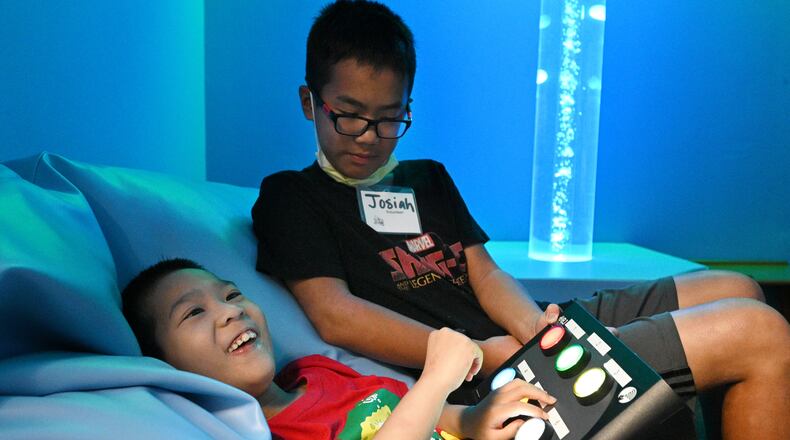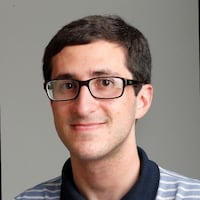Mary Reed wanted her daughter Catherine to have a place where she could learn and have fun. Reed, who is Deaf, searched Atlanta for opportunities for her medically complex daughter as she became more medically stable, and in 2016, she discovered Lekotek of Georgia, a nonprofit facilitating the inclusion of children with disabilities into their communities.
For years, Lekotek dropped off toys each month at the home and explained how each could be adapted for Catherine. It was like Santa Claus coming each month, Reed said. Throughout 2020 and much of 2021, Catherine played remotely, but this year, she was back in-person alongside 11 others campers at Lekotek’s summer computer camp.
“Lekotek opened up a whole new world of possibilities for Catherine in so many ways through the toys, eye gaze technology and the community support that we’ve gotten,” Reed said.
Lekotek’s summer camps are among a handful of summer programs for campers with learning and developmental disabilities, offering accessible and developmentally appropriate opportunities across the arts, nature and vocational fields. After two summers either fully remote or with pandemic safety precautions, many camps say this summer is the most “normal” since 2019, even amid worker shortages.
Credit: HYOSUB SHIN / AJC
Credit: HYOSUB SHIN / AJC
Advancing opportunities during the pandemic
Helene Prokesch, founder and executive director of Lekotek of Georgia, maintained services throughout the pandemic, though the past two summers the camp required parents to be with their kids to ensure social distancing.
The computer camp incorporates developmentally appropriate toys, iPad apps and computer technology into programming, such as eye gaze technology in place of computer mice. The camp has a sensory room with immersive and interactive technology from Spanish company Qinera.
Credit: HYOSUB SHIN / AJC
Credit: HYOSUB SHIN / AJC
“Our mission really is to include children into their family, and so we want them playing with a brother or sister, and even the camp has brothers and sisters that are invited,” Prokesch said.
Claudia Low’s son Toby, who suffered a brain injury shortly after birth, attends Lekotek while her older son Josiah volunteers alongside professionals.
“Toby’s everybody’s responsibility and everybody’s joy at the same time, and so Josiah’s here to be with his brother, but also I think naturally anyone with a special needs sibling is going to love special needs kids too and has a heart for them,” Low said.
Credit: HYOSUB SHIN / AJC
Credit: HYOSUB SHIN / AJC
This year is the first since 2019 that Social Skills Today, which provides respite opportunities for families of individuals with developmental disabilities, is hosting its overnight camp, alongside day camps in Gwinnett and Roswell. The camp helps students generalize social skills not explicitly taught in school into everyday activities such as arts and crafts or hiking.
Director Adrian Wilkins said camp this year has allowed campers to experience a larger community than they may have had the past two years, especially those who lacked regular social interaction at home. Though staffing was extremely difficult this year, and the camp was forced to increase costs and salaries, it will probably lose money this summer.
Staffing shortages also significantly impacted Camp Dream for campers with moderate to severe disabilities, according to Gary Marshall, the camp’s executive director. In 2020, summer programming was slashed, and in 2021, overnight camp returned but only for a small group of campers. This year, the camp is back at a one to one camper to counselor ratio, though with half as many campers as pre-pandemic due to staffing, with individualized care and outdoor activities like s’mores nights and horse and train rides.
“We really rely on people coming and giving them their time out of the goodness of their heart rather than just coming and collecting a paycheck, and just with the nature of the world we live in right now, it’s been a real challenge for us,” Marshall said.
Credit: HYOSUB SHIN / AJC
Credit: HYOSUB SHIN / AJC
Debbi Scarborough, who founded Cumberland Academy of Georgia that runs camps for students with autism, said this year has been very successful for staffing and turnout. Students come from all over the Atlanta area (and from Florida and Texas) for week-long camps themed around drama, adventure and sports. The year-round school has a 100% rate of seniors attending college or getting employment directly after graduation.
“We are not hovering over them or putting them in this safe little bubble. We are pushing them, but we still think they’re in a place that’s good for them where they can be themselves and be able to grow,” Scarborough said.
A “secret society”
A few years ago, Erickia Thompson searched for a summer camp for her son Christopher Saunders, who has autism. After struggling to even know where to look, the Rockdale County mom found Camp Artism, a vocational training camp run by House of Artists Foundation that focuses on creative arts and independent living skills. This summer, Saunders, who previously attended the camp, is serving on the board.
“Being on the board allows Chris to be a 21-year-old and represent himself but also the younger kids that are coming up,” Thompson said. “A lot of those parents, they have nowhere to take their kids for the summer. If there is the slightest bit of a behavioral problem, they can’t go to that camp.”
Thompson works to streamline the process for parents to find summer opportunities for children with disabilities with the House of Artists Foundation and Telic Empowerment. She said navigating the summer is like a “secret society” in which many parents feel lost about what to do.
“For a lot of parents, it’s hard to go out and say, ‘hey, my kid doesn’t have a camp to go to, my kid doesn’t feel like he can belong somewhere,’” she said. “A camp is really great because it helps build self-esteem. It helps them know that they are valued and it gives them hope to learn new things and to grow.”
Credit: HYOSUB SHIN / AJC
Credit: HYOSUB SHIN / AJC
Ashley Drayton, who started the foundation, said the camp encourages students “from the soul” to learn applicable skills and gain independence through activities such as underwater photography and police talks. The camp, which adapted to the pandemic over the past three summers, reaches seven cities including Atlanta. The foundation also puts on Autism’s Got Talent to showcase students’ creative abilities.
“They are able to go back to their schools and be specific about their studies,” Drayton said. “They can hone in on specific things that they may not have gotten through their K-12 program or post-education.”
For students like Saunders, who now attends the Inclusive Digital Expression and Literacy Program at Georgia State University, the camp has opened many doors.
“Some kids want to learn some of the arts, like making a film or movie, and I want them to do things by helping them,” Saunders said.
Credit: HYOSUB SHIN / AJC
Credit: HYOSUB SHIN / AJC
Tami Slaton felt similarly about the opportunities her son Emerson had at FOCUS Day Camps, which ran eight in-person sessions of Camp Hollywood. Slaton, a teacher whose son has cerebral palsy and is nonverbal, struggled to find summer activities during the pandemic because many children in the community have sensitive medical histories. When camp came back, she breathed a massive sigh of relief.
“It makes a difference because he’s with children that are similar to him, that have the same needs, and they just thrive being around each other,” Slaton said. “His eyes lit up when I dropped him off.”
Frances McBrayer, executive director at FOCUS, said because the camp is not disability specific, campers can feel like stars while learning about music, science and cooking. The camp adapts programs for campers with varying mobility and prioritizes scholarships so finances aren’t a barrier. She said this allows kids to have an exciting summer camp experience while being “engaged and involved and have all the assistance that they need.”
The camp was completely virtual in 2020, and in 2021, to offer respite to families, the camp was partially in-person with temperature checks, masking and smaller groupings. Despite staffing challenges, all camps this year had sufficient support and resources.
Slaton is now working with the parent community to foster more opportunities for children with special needs.
“In the metro area, these camps are few and far between, and there are a lot of children that really don’t get access...” she said. “I just think it’s time for us as a community to start figuring out how we can have more people find a camp for our children.”
About the Author
Keep Reading
The Latest
Featured









